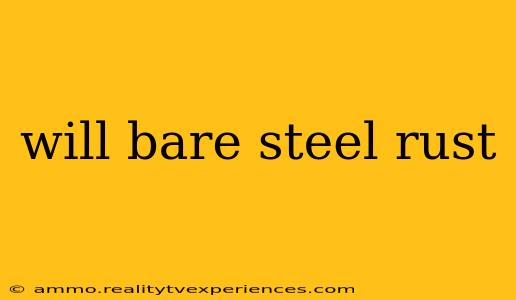Yes, bare steel will rust. This is a fundamental truth about the material, but understanding why and how it happens is key to preventing it. This comprehensive guide explores the science behind steel rusting, factors influencing the process, and practical methods for protection.
Understanding the Rusting Process: Oxidation and the Role of Iron
Rust is a common name for iron oxide, the product of iron reacting with oxygen in the presence of water or moisture. This process is called oxidation, a chemical reaction where electrons are transferred from one substance to another. In the case of steel (an alloy primarily composed of iron and carbon), iron loses electrons to oxygen, forming iron oxide (rust).
The chemical equation for this reaction is simplified as:
4Fe + 3O₂ + 6H₂O → 4Fe(OH)₃
This iron(III) hydroxide then dehydrates to form iron(III) oxide, which is the familiar reddish-brown rust we see.
Factors Affecting Rust Formation
Several factors influence the rate at which bare steel rusts:
-
Moisture: Water is essential for the rusting process. The presence of even a thin film of moisture significantly accelerates oxidation. High humidity significantly increases the risk.
-
Oxygen: Oxygen is the oxidizing agent; without it, rusting cannot occur. However, even a small amount of oxygen is sufficient to initiate the reaction.
-
Acidity (pH): Acidic environments accelerate rust formation. Rainwater, for example, is slightly acidic, making steel exposed to rain more prone to rusting.
-
Temperature: Higher temperatures generally accelerate chemical reactions, including rust formation.
-
Presence of Salts: Salt accelerates the rusting process significantly. This is why coastal areas experience more rapid corrosion of steel structures. Saltwater creates an electrolyte solution, facilitating electron transfer in the oxidation reaction.
-
Type of Steel: Different types of steel have varying resistance to rust. Stainless steel, for example, contains chromium, which forms a protective oxide layer inhibiting further oxidation.
Preventing Rust on Bare Steel: Practical Strategies
While bare steel will inevitably rust, various strategies significantly slow down or prevent the process:
1. Protective Coatings:
-
Paints: Paint acts as a barrier, preventing moisture and oxygen from reaching the steel surface. Choosing a high-quality, rust-inhibiting paint is crucial.
-
Galvanization: This involves coating the steel with a layer of zinc. Zinc is more reactive than iron and will oxidize first, protecting the steel beneath.
-
Powder Coating: A durable and aesthetically pleasing option that provides excellent protection against corrosion.
-
Electroplating: This technique deposits a thin layer of a more corrosion-resistant metal onto the steel surface.
2. Environmental Control:
-
Reducing Moisture: Keeping steel dry is the most effective preventative measure. Proper ventilation, storage in dry areas, and the use of dehumidifiers can help.
-
Avoiding Salt Exposure: Minimizing exposure to saltwater or areas with high salt concentration is crucial, especially for exterior applications.
3. Inhibitors:
Chemical compounds can be added to slow down the rusting process. These inhibitors often work by forming a protective layer on the steel surface.
Conclusion: Managing Rust in Bare Steel
Bare steel will inevitably rust; however, understanding the factors influencing the process and implementing appropriate preventive measures can significantly extend its lifespan and prevent costly damage. Choosing the right protective coating, controlling the environment, and employing corrosion inhibitors are effective strategies for managing rust and protecting your steel assets. By understanding the science behind corrosion, we can effectively combat the effects of rust.

